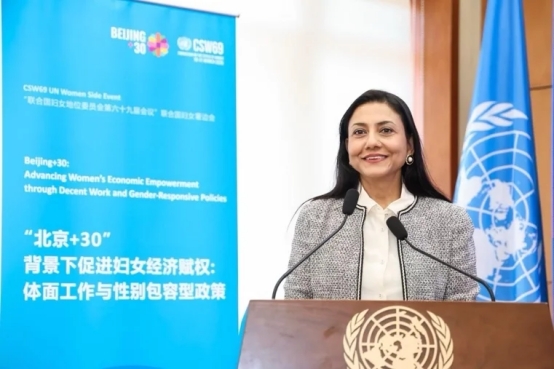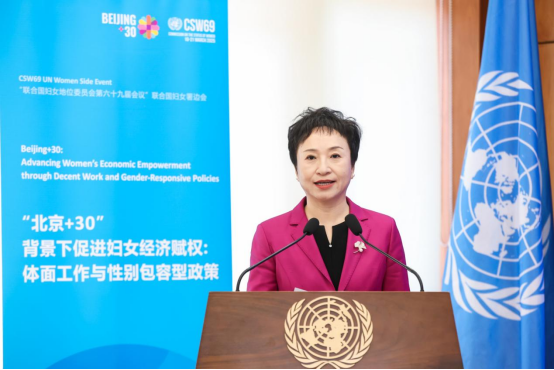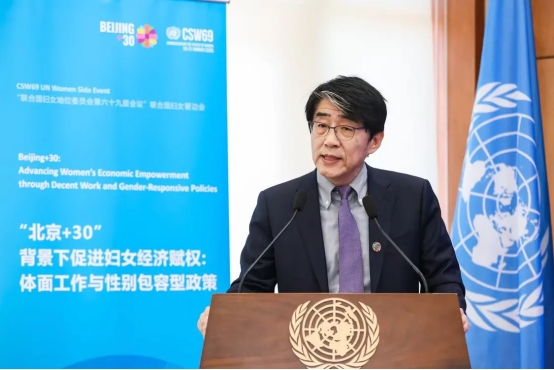The 69th Session of the United Nations Commission on the Status of Women (CSW69) took place at the UN Headquarters in New York from March 10 to 21, 2025. This year’s session focused on reviewing and evaluating the implementation of the Beijing Declaration and Platform for Action over the past thirty years, as well as the outcomes of the 23rd Special Session of the UN General Assembly. On this occasion, UN Women China Office, the China Federation of Internet Societies (CFIS), and the International Labour Organization (ILO) Country Office for China and Mongolia, successfully hosted a high-level side event on March 18. The event, which combined in-person and online participation, was titled “Beijing+30: Advancing Women’s Economic Empowerment through Decent Work and Gender-Inclusive Policies.”
The side event focused on employment issues, discussing how to address the specific needs of women and girls while alleviating vulnerabilities. It explored policies, regulations, innovative strategies, and replicable practices to combat workplace gender discrimination. Additionally, it put forward policy recommendations to foster inclusive workplaces and empower women economically. These efforts aim to unleash the potential of women to drive sustainable economic growth and contribute to economic and social development.
The side event featured the UN Secretary-General’s report on the implementation of the Beijing Declaration and Platform for Action, as well as the results of the 23rd Special Session of the UN General Assembly. It also highlighted the UN Women “Women’s Rights in Review 30 Years After Beijing” report, which outlined key priorities for future action. These priorities include ensuring a focus on gender equality, care, and decent work for women, especially in the transition to a low-carbon economy and in the context of technological advancements, particularly the rise of artificial intelligence. The report emphasizes the need to prioritize public investments in developing and expanding integrated care systems, such as paid family leave policies, universal access to health care across the life course, and proper recognition and compensation for paid caregivers. It also emphasizes the importance of improving the quality and conditions of women’s work by securing labor rights and benefits for informal workers, reducing occupational segregation, and closing the gender pay gap.
During the event, representatives from various countries and key stakeholders discussed the main opportunities and challenges women’s employment has faced over the past five years. They shared policies, practices, and initiatives aimed at promoting decent work and addressing workplace gender discrimination. Topics included training female talent, creating family-friendly workplaces, building comprehensive care systems, and promoting multi-stakeholder collaboration. Participants emphasized the crucial role of high-quality employment for women in advancing gender equality and driving economic development.
As part of the overarching theme of CSW69, this side event called on governments, businesses, and civil society organizations to take proactive steps to formulate and refine policies that promote decent work for women and create gender-inclusive environments. Special attention was given to the employment and livelihoods of women facing multiple challenges and intersectional discrimination. The event highlighted the importance of accelerating the implementation of the 2030 Agenda for Sustainable Development, as well as the Beijing Declaration and Platform for Action, ensuring that no one is left behind in the process of development.
Speakers at the event included high-level representatives such as Smriti Aryal, UN Women China Head of the Office; Zhao Hui, Secretary-General of CFIS; Changhee Lee, ILO Country Office Director for China and Mongolia; Liang Yan, Vice President of China Enterprise Confederation; and Guo Ye, Director of the Women’s Research Institute of the All-China Women’s Federation. Government representatives, academic experts, and civil society organization representatives from countries including China, Kenya, and Malta shared their insights, policies, and practices related to the topic.
In her welcoming remarks, Smriti Aryal emphasized, “Women’s right to employment and the rights they enjoy in the workplace are fundamental to ensuring women’s overall well-being, enabling them to realize their full potential, and promoting gender equality. These rights also profoundly impact women’s health, education, and overall quality of life. As more women enter the workforce and engage in stable, long-term employment, business profitability and operational efficiency significantly improve, thereby driving national economic growth. As we move toward 2030, it is critical that we act with urgency and proactively. The goals promised in the Beijing Declaration and Platform for Action can only be achieved through joint efforts from all stakeholders.”

Photo: Smriti Aryal, UN Women China Head of the Office
Zhao Hui emphasized, “By implementing the strategy of building a strong cyberpower and leveraging digital empowerment to promote the comprehensive development of women, we can protect the rights and interests of women and children in cyberspace. We will continue to carry out digital literacy education and skills training for women, promote and support women’s digital employment and entrepreneurship, and advocate for the role of civil society organization in empowering women economically by providing support and services.”

Photo: Zhao Hui, Secretary-General of CFIS
Changhee Lee said, “All women are working women, whether their work is paid or unpaid, and it must be recognized and valued. Let’s commit to a future where every woman is empowered, enabling every woman to thrive and contribute fully to our economies and societies.”

Photo: Changhee Lee, ILO Country Office Director for China and Mongolia
Liang Yan emphasized that eliminating gender discrimination and bias in the workplace and fostering a more inclusive environment would help businesses fully tap into employees’ enthusiasm, initiative, and creativity. This, in turn, would enhance their sense of achievement, happiness, and security, while also significantly boosting social productivity and economic vitality, ultimately leading to the creation of greater social value.
Guo Ye pointed out that the Beijing Declaration and Platform for Action had provided a strong foundation for tackling the structural barriers women face. She noted that over the past thirty years, China had made significant progress in women’s development. She emphasized the importance of studying the experiences behind these achievements and adopting more forward-thinking, technical, and systematic approaches to address emerging challenges. According to her, women’s organizations, research institutions, government departments, and enterprises should engage in more practical and in-depth cooperation to effectively respond to the diverse needs of women and work together to advance gender equality and other sustainable development goals.